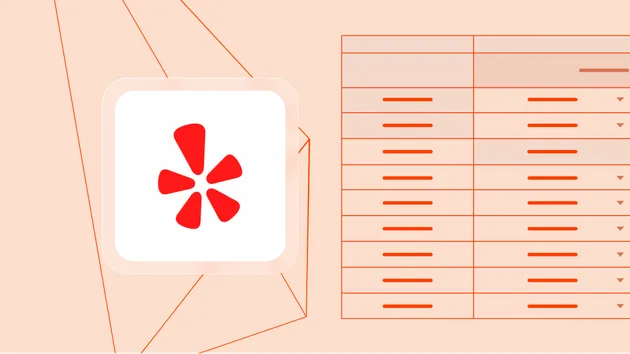Yelp Scraper
Pricing
$1.00 / 1,000 results
Yelp Scraper
Free Yelp web scraper to extract data from Yelp. Fast Yelp review scraper, but also gets business details and ratings without using the Yelp API.
What does Yelp Scraper do?
Yelp Scraper is an Apify actor that allows you to extract data from Yelp quickly. It can extract business details, ratings, and reviews without using the Yelp API.
Yelp Scraper can scrape:
- Business name
- Address
- Phone number
- Rating
- Review text
Why scrape Yelp?
Yelp is a popular platform for finding local businesses, with millions of reviews and ratings. It is an excellent source of data for businesses looking to improve their online presence or conduct market research.
Here are some ways you could use Yelp data:
- Analyze customer sentiment and improve your product or service based on feedback
- Identify popular businesses in a specific area to inform business decisions
- Track competitors and monitor customer sentiment towards them
If you would like more inspiration on how scraping Yelp could help your business or organization, check out our industry pages.
How to scrape Yelp
It's easy to scrape Yelp with Yelp Scraper. Just follow these few steps, and you'll get your data in a few minutes.
- Click on Try for free.
- Enter the search terms or location you want to scrape.
- Click on Run.
- When Yelp Scraper has finished, preview or download your data from the Dataset tab.
How many results can you scrape with Yelp scraper?
Yelp scraper can return up to 240 results on average. However, you have to keep in mind that scraping yelp.com has many variables to it and may cause the results to fluctuate case by case. There’s no one-size-fits-all-use-cases number. The maximum number of results may vary depending on the complexity of the input, location, and other factors. Some of the most frequent cases are:
- website gives a different number of results depending on the type/value of the input
- website has an internal limit that no scraper can cross
- scraper has a limit that we are working on improving
Therefore, while we regularly run Actor tests to keep the benchmarks in check, the results may also fluctuate without our knowing. The best way to know for sure for your particular use case is to do a test run yourself.
How much will scraping Yelp cost you?
When it comes to scraping, it can be challenging to estimate the resources needed to extract data as use cases may vary significantly. That's why the best course of action is to run a test scrape with a small sample of input data and limited output. You’ll get your price per scrape, which you’ll then multiply by the number of scrapes you intend to do.
Watch this video for a few helpful tips. And don't forget that choosing a higher plan will save you money in the long run.
Output
Here's an example of Yelp Scraper's output:
Tips for scraping Yelp
- Use relevant search terms to get the most accurate results.
- Be mindful of Yelp's terms of service and follow them to avoid legal issues.
Is it legal to scrape Yelp?
Note that personal data is protected by GDPR in the European Union and by other regulations around the world. You should not scrape personal data unless you have a legitimate reason to do so. If you're unsure whether your reason is legitimate, consult your lawyers. We also recommend that you read our blog post: is web scraping legal?
Not your cup of tea? Build your own scraper
Yelp scraper doesn’t exactly do what you need? You can always build your own! We have various scraper templates in Python, JavaScript, and TypeScript to get you started. Alternatively, you can write it from scratch using our open-source library Crawlee. You can keep the scraper to yourself or make it public by adding it to Apify Store (and find users for it).
Or let us know if you need a custom scraping solution.
Your feedback
We’re always working on improving the performance of our Actors. So if you’ve got any technical feedback for Yelp Scraper or simply found a bug, please create an issue on the Actor’s Issues tab in Apify Console.



